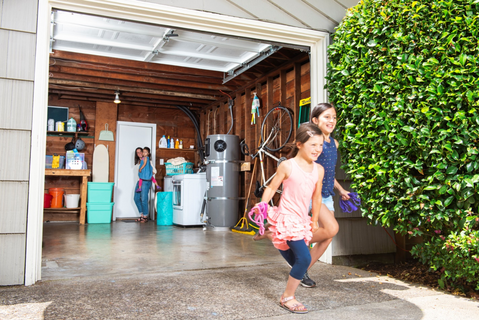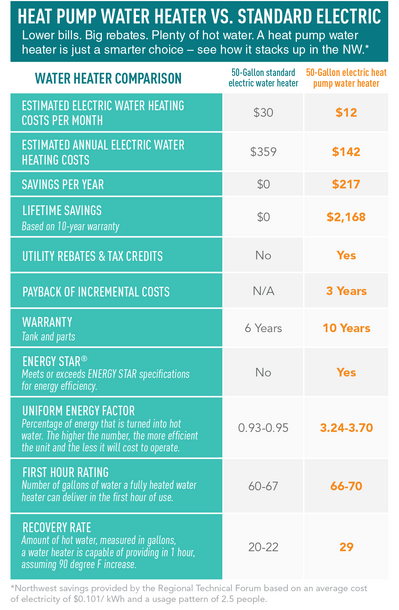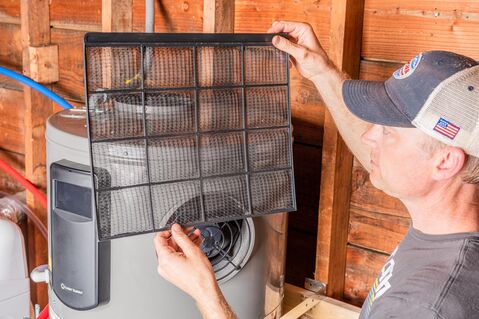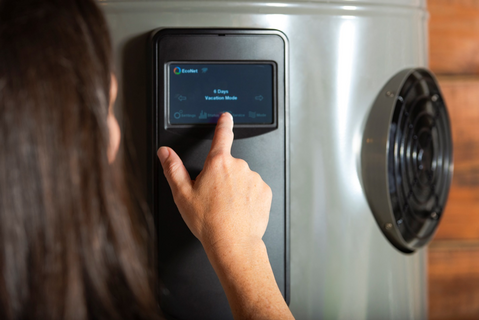Why go high-efficiency?
Upgrading to an efficient water heater will save you money over time (upwards of $3,000), but that’s not the only benefit. A heat pump water heater, for example, will perform similar to — or better than — a conventional electric model (more on that below) and come with a longer warranty. If a water heater can do all that while using significantly less energy, why not make the switch?
What is a heat pump water heater?
Heat pump water heaters, sometimes referred to as hybrid water heaters, work like a refrigerator in reverse: They capture heat from the surrounding air and transfer it to the storage tank to heat the water. Using existing heat makes heat pump water heaters up to three times more efficient than conventional electric water heaters, which must generate their own heat using an electric resistance element. Because water heaters can make up about 20% of your electricity costs, this efficiency is key to lowering your electricity bill.
Is it time to replace yours?
If your water heater is over 10 years old, you should start thinking about replacing it. Water heaters typically start failing when they are 10 to 15 years old, but waiting until it breaks can be costly: The average insurance claim for water damage due to a failed water heater is $4,000. And to make things worse, you may be stuck without hot water or end up with a flooded home.
Wondering how old your current water heater is? Check the manufacturer label or use our serial number decoder.
Things to consider before you buy
Fuel source
Water heaters can be powered in a number of ways; electricity and gas are the most common types, and propane, oil and solar models also exist. Heat pump water heaters are ideal replacements for electric water heaters, since they are powered by electricity but inexpensive to run thanks to their ultra-efficient technology.
Tank capacity and water heater size
Make sure your new water heater can handle your household’s hot water usage by considering the number of bedrooms and bathrooms in your house. Most hybrid electric water heaters come in three sizes:
Small (50 gallons)
for up to two adults
Medium (66 gallons)
for three adults or two adults and two children
Large (80 gallons)
for households of five or more
Keep in mind a water heater that’s too small can prevent you from using hot water in multiple places at once (like the shower and dishwasher). If you’re in doubt, it’s OK to size up — bigger heat pump water heaters can be more efficient in the long run, since they’re less likely to rely on backup electric resistance heating.
What about tankless? Tankless water heaters (also known as on-demand water heaters) are nearly as efficient as heat pump heat pump water heaters, and can be a great choice for homes with existing gas-powered water heat.

How much space you’ll need
Heat pump water heaters work well in most garages and basements in the Northwest. The water heater will work if the air temperature immediately around the water heater doesn’t drop below freezing, and it will efficiently deliver hot water in temperatures above 37 °F.
If your current water heater is in a tight space, check that there is enough room for a heat pump water heater — they’re often slightly taller than conventional models and they require more open air space to operate, about 750 cubic feet. Even if space is at a premium, it’s possible a heat pump water heater can be installed in a closet with features like louvered doors and proper ventilation or ducting.
Comparing Water Heaters

Recovery rate
The recovery rate is the number of gallons of hot water a water heater can provide within an hour after being completely drained. If you use hot water often throughout the day, look for a water heater with a higher recovery rate.
Compared with conventional electric models, heat pump water heaters typically have higher recovery rates.
Uniform Energy Factor (UEF) rating
A water heater’s UEF rating is a measure of its energy efficiency, with higher numbers denoting more efficient units. The UEF calculation is based off of how much energy the water heater uses and how much energy is used to power the water heater itself.
Think of UEF like an exchange rate: Water heaters with high UEF ratings will yield a higher return on every dollar of energy you put in. In general, ENERGY STAR certified conventional gas and electric water heaters have UEF ratings between 0.65 and 0.95 — or 65 to 95 cents on the dollar — while heat pump water heaters have much higher UEF ratings of 2.75 to 3.5.
Cost
Conventional water heaters generally have a lower purchase price than heat pump water heaters. However, the lower operating cost of heat pump models means the difference in sticker price will be made up in about three years — after that, the heat pump water heater will cost $300 less every year than a conventional model. Generally, you can expect a heat pump water heater to provide incremental savings for up to 12 years after the initial payback period, for a total of up to $3,600. Plus, many utilities in the Northwest offer customers cash rebates to help offset the initial purchase price.
Warranty
Most conventional water heaters come with a 6-year warranty, and have an expected lifetime of 10 to 15 years. For heat pump water heaters, a longer 10-year warranty comes standard, giving you a little more peace-of-mind.

Getting the most out of your heat pump water heater
There are a couple ways in which heat pump water heaters are more user-friendly and connected than conventional models. Following these guidelines will help your water heater operate at its optimum level:
- Heat pump water heaters feature a control panel that allows you to select the water temperature and switch between operation modes. Depending on how much water you expect to use, setting your unit to Auto, Economy/Hybrid or Vacation can minimize wasted energy.
- Some heat pump water heaters can connect with smart home systems such as Google Nest, which can automatically set the water heater to Economy mode when you're away.
- Heat pump water heaters use air filters that should be cleaned periodically to ensure efficient operation. This simply involves wiping filter with a damp cloth, rinsing it under running water and letting it dry.
Buying your heat pump water heater
Heat pump water heaters are available from every major manufacturer, including well-known brands like Rheem, A.O. Smith, Reliance, and Bradford White. Visit our retailer and installer locators to find options near you.
In addition to any promotions you might find at the store, you can save even more through utility rebates — check here to see offers near you.



